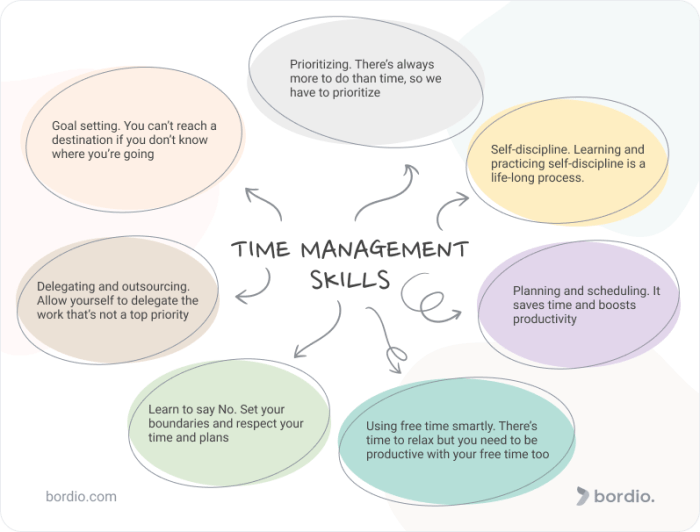Time management skills are essential for success in all aspects of life. From juggling school assignments to meeting work deadlines, the ability to manage your time effectively can make a significant difference. In this guide, we’ll explore the key components of time management skills and strategies to help you improve your efficiency and productivity.
Importance of Time Management Skills

Time management skills are essential in both personal and professional settings as they allow individuals to prioritize tasks, allocate resources efficiently, and meet deadlines effectively. Without proper time management, individuals may struggle to accomplish their goals, leading to increased stress and decreased productivity.
Effective time management can lead to increased productivity by helping individuals focus on important tasks, avoid procrastination, and make the most out of their time. By setting clear goals, creating a schedule, and eliminating distractions, individuals can streamline their workflow and accomplish more in less time.
On the other hand, poor time management can have a negative impact on work quality and overall well-being. When individuals fail to manage their time effectively, they may feel overwhelmed, miss deadlines, and deliver subpar work. This can not only affect their professional reputation but also lead to increased stress and burnout.
Benefits of Effective Time Management
- Improved productivity: By prioritizing tasks and staying organized, individuals can accomplish more in less time.
- Reduced stress: Effective time management helps individuals avoid last-minute rushes and feel more in control of their workload.
- Enhanced work quality: By allocating time wisely, individuals can focus on tasks that require more attention and deliver better results.
Key Components of Time Management Skills

Effective time management involves several key components that help individuals make the most of their time and stay organized. Let’s explore some of the essential aspects of time management skills.
Goal Setting
Setting clear and achievable goals is crucial for effective time management. By defining your objectives, you can prioritize tasks and allocate your time accordingly. It helps you stay focused and motivated, ensuring that you work towards meaningful outcomes.
Prioritization
Prioritizing tasks based on their importance and urgency is another critical component of time management. By identifying high-priority tasks and tackling them first, you can maximize productivity and prevent important deadlines from being missed.
Task Delegation
Learning to delegate tasks to others when necessary is an important skill in time management. Delegating responsibilities to team members or colleagues can help you focus on more critical tasks and improve overall efficiency.
Planning and Scheduling
Effective planning and scheduling play a vital role in time management. By creating a daily or weekly schedule, you can allocate specific time slots for different tasks, meetings, and activities. This helps you stay organized and ensures that you make the most of your available time.
Breaking Down Tasks, Time management skills
Breaking down complex tasks into smaller, manageable steps is key to better time management. By dividing tasks into smaller sub-tasks, you can focus on one task at a time, track progress more effectively, and avoid feeling overwhelmed.
Strategies for Improving Time Management
Effective time management is essential for success in any endeavor. By implementing the right strategies, you can make the most of your time and achieve your goals efficiently.
Tips for Creating a Daily or Weekly Schedule
- Start by listing all your tasks and deadlines.
- Allocate specific time slots for each task based on priority and urgency.
- Include breaks in your schedule to avoid burnout.
- Review and adjust your schedule regularly to accommodate any changes.
Importance of Setting SMART Goals
SMART goals are Specific, Measurable, Achievable, Relevant, and Time-bound.
Setting SMART goals helps you clarify what you want to achieve and creates a roadmap for success. By setting clear objectives, you can focus your time and energy on tasks that align with your goals.
Techniques for Overcoming Procrastination
- Break tasks into smaller, more manageable steps to reduce overwhelm.
- Use tools like timers or productivity apps to stay on track and avoid distractions.
- Reward yourself for completing tasks to stay motivated and combat procrastination.
- Practice mindfulness and stay present in the moment to avoid getting lost in distractions.
Technology Tools for Time Management
In today’s fast-paced world, technology plays a crucial role in helping individuals manage their time effectively. By utilizing various apps and software, people can streamline their workflow, stay organized, and boost their overall efficiency.
Popular Apps and Software for Time Management
- 1. Google Calendar: A popular calendar app that allows users to schedule events, set reminders, and share calendars with others.
- 2. Todoist: A task manager app that helps users create to-do lists, set deadlines, and prioritize tasks.
- 3. Evernote: A note-taking app that allows users to jot down ideas, create checklists, and organize information in one place.
- 4. Trello: A project management tool that enables users to create boards, lists, and cards to track progress and collaborate with team members.
- 5. RescueTime: A productivity app that tracks time spent on various activities and provides insights to help users optimize their daily routines.
Benefits of Using Technology Tools for Time Management
- 1. Streamline Workflow: By using calendars and task managers, individuals can prioritize tasks, set deadlines, and avoid multitasking, resulting in a more efficient workflow.
- 2. Boost Efficiency: Productivity apps like Evernote and Trello help users stay organized, collaborate with others, and focus on high-priority tasks, leading to increased efficiency.
- 3. Track Progress: Tools like RescueTime provide valuable insights into how time is being spent, allowing users to identify time-wasting activities and make necessary adjustments to improve productivity.
Personal Experiences with Technology Tools for Time Management
Personally, I have found great success in using Google Calendar to schedule my daily tasks and set reminders for important deadlines. By utilizing Todoist, I can create detailed to-do lists and prioritize tasks based on their urgency. These tools have significantly improved my time management skills and helped me stay on track with my responsibilities.